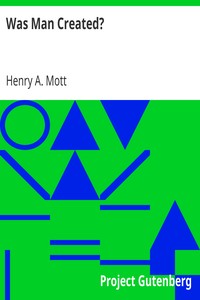Was Man Created? by Henry A. Mott
Read now or download (free!)
| Choose how to read this book | Url | Size | ||||
|---|---|---|---|---|---|---|
| Read online (web) | https://www.gutenberg.org/ebooks/30429.html.images | 254 kB | ||||
| EPUB3 (E-readers incl. Send-to-Kindle) | https://www.gutenberg.org/ebooks/30429.epub3.images | 2.9 MB | ||||
| EPUB (older E-readers) | https://www.gutenberg.org/ebooks/30429.epub.images | 2.9 MB | ||||
| EPUB (no images, older E-readers) | https://www.gutenberg.org/ebooks/30429.epub.noimages | 147 kB | ||||
| Kindle | https://www.gutenberg.org/ebooks/30429.kf8.images | 2.8 MB | ||||
| older Kindles | https://www.gutenberg.org/ebooks/30429.kindle.images | 2.8 MB | ||||
| Plain Text UTF-8 | https://www.gutenberg.org/ebooks/30429.txt.utf-8 | 216 kB | ||||
| Download HTML (zip) | https://www.gutenberg.org/cache/epub/30429/pg30429-h.zip | 2.9 MB | ||||
| There may be more files related to this item. | ||||||
About this eBook
| Author | Mott, Henry A. (Henry Augustus), 1852-1896 |
|---|---|
| Title | Was Man Created? |
| Note | Reading ease score: 54.9 (10th to 12th grade). Somewhat difficult to read. |
| Credits |
Produced by Marilynda Fraser-Cunliffe, Stephanie Eason, and the Online Distributed Proofreading Team at http://www.pgdp.net. |
| Summary | "WAS MAN CREATED?" by Henry A. Mott is a scientific publication written in the late 19th century. This work engages in a critical examination of human origins, delving into topics related to evolution, the nature of life, and the intersection of science and religion. Mott primarily aims to explore whether human beings were created in the traditional sense or if they evolved from simpler forms of life. The opening portion of the text introduces the concepts that will be explored throughout the publication. Mott begins by addressing the question of whether man was intentionally created by a divine act, stating that the purpose of science is to seek the truth rather than support preconceived beliefs. He discusses the significance of protoplasm as a fundamental substance of life, describing its characteristics and its role in the development of living organisms. Additionally, Mott outlines the scientific basis for the theory of evolution, pointing to the evidence of spontaneous generation and gradual development as methods through which simpler life forms transitioned into more complex beings, ultimately culminating in modern humans. The author emphasizes the unity of all life and hints at the scientific exploration that will follow in the subsequent sections of the book. (This is an automatically generated summary.) |
| Language | English |
| LoC Class | QH: Science: Natural history |
| Subject | Natural selection |
| Subject | Evolution |
| Subject | Creation |
| Subject | Human beings -- Origin |
| Category | Text |
| EBook-No. | 30429 |
| Release Date | Nov 8, 2009 |
| Copyright Status | Public domain in the USA. |
| Downloads | 282 downloads in the last 30 days. |
| Project Gutenberg eBooks are always free! | |

